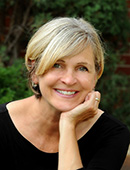Oprah.com selects Randolph’s memoir
 Ladette Randolph, editor-in-chief of Ploughshares, Emerson’s literary magazine, recently released a memoir, Leaving the Pink House (University of Iowa Press), which was featured on Oprah.com as a suggested memoir.
Ladette Randolph, editor-in-chief of Ploughshares, Emerson’s literary magazine, recently released a memoir, Leaving the Pink House (University of Iowa Press), which was featured on Oprah.com as a suggested memoir.
Published in September, Leaving the Pink House reveals Randolph’s crucial lifetime moments, including her battle with a rare form of cancer and a disheartening divorce.
Randolph, who is also a faculty member in Writing, Literature and Publishing, says she “was surprised” by the Oprah.com publicity considering the thousands of books the website reviews every year.
“What meant the most to me about the review was that the reviewer actually ‘got’ the book,” Randolph said.
Describe the creative process of writing a memoir.
Randolph: Writing nonfiction, especially something as personal as a memoir, was emotionally challenging at times. The structure of Leaving the Pink House is a little unusual. The framing story is about a ruined farmhouse that my husband and I gutted and rebuilt ourselves while the intervening story is about my own life, which in some senses was also gutted and rebuilt. I wrote the framing story about 10 years ago and the backstory chapters were written well before that, but it wasn’t until I found a way to combine them that I felt the story started to gel.
What feelings did you experience as you captured pivotal moments of your life within this memoir?
I think by the time a writer has digested experience enough to write a memoir, he or she is no longer feeling the intensity of the experiences as lived. Like Chekhov advises, it’s best to approach writing “cold” if you wish to create a strong feeling in the reader. It sounds very counterintuitive, but I think it’s important for writers to have that sort of control over their material.
Why is your story unique and relatable?
I think my experience growing up in a remote, rural part of Nebraska is a bit unique. I also think my experiences growing up in a fundamentalist Christian tradition and breaking that tradition not as a rebellious teenager, but as an adult, are maybe not all that common. The same is true of the framing story. I have to trust that despite the unusual nature of some of my life experiences, I’m always a human being responding to them. Ultimately, we’re much more alike than we think we are.
What words of advice would you give to rising authors also aspiring to share their stories?
Write. Don’t talk about writing. Write.
Categories